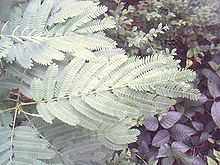Desmanthus illinoensis
| Desmanthus illinoensis | |
|---|---|
 | |
| Desmanthus illinoensis | |
 | |
| Desmanthus illinoensis seeds | |
| Scientific classification | |
| Kingdom: | Plantae |
| (unranked): | Angiosperms |
| (unranked): | Eudicots |
| (unranked): | Rosids |
| Order: | Fabales |
| Family: | Fabaceae |
| Genus: | Desmanthus |
| Species: | D. illinoensis |
| Binomial name | |
| Desmanthus illinoensis (Michx.) MacMill. ex B. L. Rob. & Fernald[1] | |
Desmanthus illinoensis (commonly known as Illinois bundleflower, prairie-mimosa or prickleweed) is a common plant in many areas of the south central and Midwestern US. It can often be found growing on the sides of roads, needing full sun and ample moisture during its short growing season.
Root bark of D. illinoensis has been found to contain N,N-DMT, NMT, N-hydroxy-N-methyltryptamine, 2-hydroxy-N-methyltryptamine, and gramine (toxic). The root bark is mixed with a native source of beta-Carbolines to produce a hallucinogenic drink called prairiehuasca, which is an analog of the shamanic brew ayahuasca.[2]
USDA Zones 5-8 are recommended for outside cultivation.
The Land Institute in Salina Kansas has done extensive research into the food uses of the seeds of this plant.[3]
See also
- Psychedelic plants
- Ethnobotanical
References
- ↑ "Desmanthus illinoensis information from NPGS/GRIN". www.ars-grin.gov. Retrieved 2008-04-27.
- ↑ Google Book Search. books.google.com. Retrieved 2010-07-26.
- ↑ "Desmanthus illinoensis". www.greenmangardens.net. Retrieved 2008-05-06.